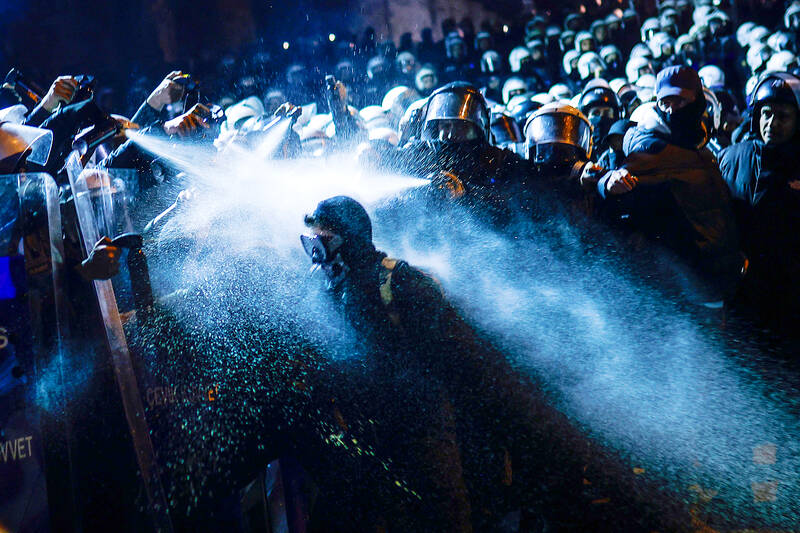A Turkish court yesterday formally placed Istanbul Mayor Ekrem Imamoglu under arrest as part of a graft investigation, after a fourth night of mass protests sparked heavy clashes with riot police.
The decision was confirmed by one of Imamoglu’s lawyers, with the court also due to rule in a second “terror-related” probe into the popular opposition mayor, whose detention has sparked Turkey’s worst street protests in over a decade.
“No despair! Keep fighting!” the main opposition Republican People’s Party (CHP) wrote on X, denouncing it as “a political coup d’etat.”

Photo: AFP
The news came as voters cast their ballots in a CHP primary to name Imamoglu the party’s candidate for the 2028 presidential race.
The long-planned vote was the event that triggered the arrest of Imamoglu, who is widely seen as the only politician capable of challenging Turkish President Recep Tayyip Erdogan.
He was detained in connection with two probes alleging graft and “aiding a terror organization” — accusations which he on Saturday told police were “immoral and baseless.”
The move against him sparked protests in Istanbul that have since spread to more than 55 of Turkey’s 81 provinces, unleashing running battles with police, who arrested 323 people overnight, officials said.
Polls opened at 8am with 5,600 ballot boxes in 81 cities.
The CHP said the vote was open to everyone, not just members, in the hope of a massive show of support for Imamoglu.
“I invite our nation ... to the ballot box. We are casting our vote to support President Ekrem: for democracy, justice and the future,” his wife, Dilek Kaya Imamoglu, wrote on X, shortly after voting with her son, Selim Imamoglu.
“We are not afraid and we will never give up,” she added.
Earlier, opposition leader and CHP head Ozgur Ozel said he and the mayor’s wife had been allowed to spend five minutes with Ekrem Imamoglu after the prosecution ended its all-night interrogation, saying he was in good spirits.
“He said this process had led to a great awakening for Turkey which he was happy about,” said Ozel, who put turnout at the Istanbul protest on Saturday at more than 500,000.
Riot police used rubber bullets, pepper spray and percussion grenades on the Istanbul protesters, toughening their methods shortly after midnight and forcing those who could to take refuge inside the city hall building.
In the capital, Ankara, riot police used water cannons to push back protesters, while in the western coastal city of Izmir, police blocked a student march headed toward the local offices of the ruling Justice and Development Party (AKP).
“Dictators are cowards” and “AKP, you will not silence us” read some protesters’ placards.
The nightly protests began shortly after Ekrem Imamoglu was taken to the courthouse to answer prosecutors’ questions in the two investigations.
The first interrogation began at 7:30pm, ending at about midnight, with the second starting shortly after, ending at about 7:30am, media reports and his legal team said.
Police set up a tight security cordon around the courthouse, where about 1,000 protesters stood nearby shouting slogans.
On Saturday, the 53-year-old mayor denied the charges against him, telling police his arrest had done untold damage to Turkey’s image, in a statement released by City Hall.
“This process has not only harmed Turkey’s international reputation, but has also shattered the public’s sense of justice and trust in the economy,” he said.
The move against him badly hurt the lira and caused chaos in Turkey’s financial markets, with the benchmark BIST 100 index on Friday closing nearly 8 percent lower.
“We are here today to stand up for the candidate we voted for,” 30-year-old Aykut Cenk said outside the court, holding a Turkish flag. “We are not the enemy of the state, but what is happening is unlawful.”

‘HYANGDO’: A South Korean lawmaker said there was no credible evidence to support rumors that Kim Jong-un has a son with a disability or who is studying abroad South Korea’s spy agency yesterday said that North Korean leader Kim Jong-un’s daughter, Kim Ju-ae, who last week accompanied him on a high-profile visit to Beijing, is understood to be his recognized successor. The teenager drew global attention when she made her first official overseas trip with her father, as he met with Chinese President Xi Jinping (習近平) and Russian President Vladimir Putin. Analysts have long seen her as Kim’s likely successor, although some have suggested she has an older brother who is being secretly groomed as the next leader. The South Korean National Intelligence Service (NIS) “assesses that she [Kim Ju-ae]

In the week before his fatal shooting, right-wing US political activist Charlie Kirk cheered the boom of conservative young men in South Korea and warned about a “globalist menace” in Tokyo on his first speaking tour of Asia. Kirk, 31, who helped amplify US President Donald Trump’s agenda to young voters with often inflammatory rhetoric focused on issues such as gender and immigration, was shot in the neck on Wednesday at a speaking event at a Utah university. In Seoul on Friday last week, he spoke about how he “brought Trump to victory,” while addressing Build Up Korea 2025, a conservative conference

DEADLOCK: Putin has vowed to continue fighting unless Ukraine cedes more land, while talks have been paused with no immediate results expected, the Kremlin said Russia on Friday said that peace talks with Kyiv were on “pause” as Ukrainian President Volodymyr Zelenskiy warned that Russian President Vladimir Putin still wanted to capture the whole of Ukraine. Meanwhile, US President Donald Trump said that he was running out of patience with Putin, and the NATO alliance said it would bolster its eastern front after Russian drones were shot down in Polish airspace this week. The latest blow to faltering diplomacy came as Russia’s army staged major military drills with its key ally Belarus. Despite Trump forcing the warring sides to hold direct talks and hosting Putin in Alaska, there

North Korea has executed people for watching or distributing foreign television shows, including popular South Korean dramas, as part of an intensifying crackdown on personal freedoms, a UN human rights report said on Friday. Surveillance has grown more pervasive since 2014 with the help of new technologies, while punishments have become harsher — including the introduction of the death penalty for offences such as sharing foreign TV dramas, the report said. The curbs make North Korea the most restrictive country in the world, said the 14-page UN report, which was based on interviews with more than 300 witnesses and victims who had